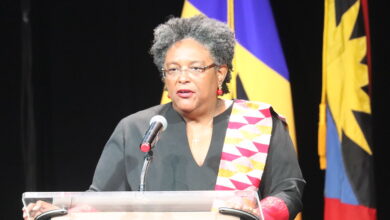CASTRIES, St Lucia — Commonwealth ministers, policymakers and cybersecurity experts are currently gathering in St Lucia for a three-day meeting (16-18 March) to tackle rising cybercrime in the Caribbean. The meeting will provide a platform for participants to address challenges and develop a coordinated regional action plan to prevent cybercrime and improve cybersecurity. This will involve setting up a virtual platform to share expertise and best practice.
Those in attendance will include ministers responsible for legal affairs, ICT and National security, attorneys general from the Caribbean and international organisations, such as Interpol, the Council of Europe, FBI and the Caribbean Community (CARICOM).
“Drawing on our strengths as one Commonwealth, we have the opportunity to tackle cybercrime and ensure technology platforms are secure. We can then direct precious resources to helping societies flourish,” said Commonwealth deputy secretary-general Josephine Ojiambo.
The Commonwealth Cybercrime Initiative conducted assessments in five Commonwealth Caribbean countries (Trinidad and Tobago, Grenada, Dominica, Antigua and Barbuda and Barbados), which found an upsurge in cybercrime. It noted a high number of incidences in the private sector and found that cases are not reported because of perceived reputational damage and lack of capacity.
Cybercrimes reported in the region to date have included the theft of US$150 million from the Bank of Nova Scotia in Jamaica in 2014; individuals claiming to be local ISIS supporters hacked government websites in 2015; and, in the same year, tax authorities in the region were infected by ransomware, which blocks users from accessing their systems and demands money.
“The emergence of e-Commerce, e-government and other technologically enabled services in the Caribbean has opened up new avenues for economic activity and for cybercriminals to exploit. Insider threats have accounted for over 50% of all security breaches. This in conjunction with the exponential growth in internet usage and mobile devices has created new vulnerabilities and will require industry-strength cybersecurity to protect important digital assets,” said Tony Ming, ICT adviser at the Commonwealth Secretariat.
The issue of cybercrime in the Commonwealth was first addressed by the Caribbean Telecommunications Union (CTU) at its ministerial conference in Barbados in
2011, which focused on a regional strategy for cybersecurity. This resulted in the Declaration of St Philip, Barbados, on Caribbean Collaboration on Cyber Security, which was ratified in 2013.
Bernadette Lewis, secretary general of the CTU, one of the meeting’s lead partners commented: “We welcome the opportunity to partner again with the Commonwealth Secretariat to advance the region’s economic and social development using enabling technology.”
Francis Forbes, executive director of the CARICOM Implementation Agency for Crime and Security, also a lead partner, said: “Strengthening CARICOM’s resilience to cybercrime is one of 14 strategic goals outlined by the CARICOM crime and security strategy (CCSS). Cybercrime is considered a ‘Tier 1’ risk, which can result in serious damage to vital infrastructures and can undermine economic health. The CCSS represents a comprehensive and integrated response to tackling common cybercrime risks and threats facing CARICOM member states.”






